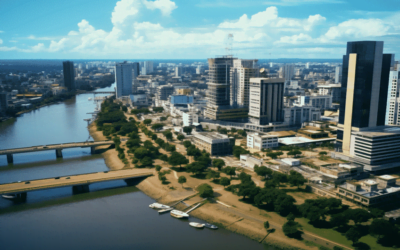Hey there, fellow drone enthusiasts and curious explorers! Are you gearing up for some high-flying adventures in the stunning landscapes of Mauritius?
Or perhaps you’re a resident looking to brush up on the latest drone regulations on this paradise island? Well, you’ve come to the right place because I’ve got your back.
I know how important it is to understand the ins and outs of Mauritius drone laws, whether you’re here for leisure, business, or simply seeking knowledge.
I’ve delved into the depths of research to provide you with the most up-to-date information on Mauritius drone laws. Trust me, I’ve been where you are, with countless questions about flying drones in this breathtaking destination.
So, I’ve scoured official documents, connected with local authorities, and sifted through the latest updates to ensure you get the most accurate and comprehensive answers to your drone-related inquiries.
From recreational flying to commercial endeavors, I’ve got the details that will keep you compliant and safe.
Ready to unlock the mysteries of Mauritius Drone Laws? Well, keep reading, because my article has all the answers you’re seeking.
I’ve simplified the complex regulations, thrown in real-life examples, and shared my own experiences to make it an engaging and informative read.
Whether you’re a newbie looking to capture those breathtaking aerial shots or an experienced pilot navigating the Mauritian skies, I’m here to guide you. So, dive into the world of drone regulations, and let’s ensure your drone flights in Mauritius are both legal and spectacular.
- Mauritius Drone Laws Overview
- General Drone Laws in Mauritius
- Drone Regulations for Different Categories of Operators in Mauritius
- Commercial Drone Laws for Residents of Mauritius
- Drone Regulations for Visitors to Mauritius
- Drone Rules for Government Drone Operators in Mauritius
- Additional Guidelines and Tips for Drone Operators in Mauritius
- Traveling with Drones in Mauritius
- Final Thoughts on Mauritius Drone Laws
- Frequently Asked Questions on Drone Laws in Mauritius
Mauritius Drone Laws Overview

Ah, it’s time to dig into the fascinating world of Mauritius Drone Laws, and trust me, it’s not as daunting as it may seem. Let’s start with the basics.
Drone Regulator in Mauritius
In this beautiful island nation, when it comes to drones and their regulations, the go-to authority is the Mauritius Department of Civil Aviation (DCA). Picture them as the guardians of the sky, ensuring that drone operations are both safe and respectful of the local environment.
Mauritius Department of Civil Aviation (DCA) as the Regulating Authority
The Mauritius Department of Civil Aviation, or DCA for short, plays a pivotal role in overseeing drone activities in the country. They’re the ones who set the rules, guidelines, and standards to ensure that flying drones in Mauritius is an enjoyable and, most importantly, a safe experience.
Mauritius Civil Aviation Drone Regulations
Now, here’s a nugget of gold for all you drone enthusiasts and inquisitive minds: if you want to dive deep into the specifics, you can explore the Mauritius Civil Aviation Drone Regulations online. These documents will be your trusted companions in deciphering the do’s and don’ts of drone flights on this stunning island.
So, as you embark on your drone adventure, remember that the DCA is there to guide you through the friendly skies of Mauritius, and the regulations are like your flight plan, ensuring a smooth journey for both
Also Read: Drone Regulation in Mauritania 2024
General Drone Laws in Mauritius

Whether you’re a newbie or a seasoned pro in the drone world, you’ve got to follow the same set of rules when flying your birdie in the Mauritian skies. It’s all about ensuring safety, privacy, and harmony with the environment.
Primary Drone Laws and Regulations
So, what are these laws, you might ask? Let me break it down for you. First and foremost, there’s an altitude limit of 120 meters (or 400 feet) for your drone. Think of it as a designated ceiling; don’t cross it! This keeps the airspace organized and safe for everyone.
But that’s not all. You’ve got to steer clear of congested areas, my friend. When I say “congested,” I picture a busy street during rush hour. You’re not allowed to fly within 150 meters (or 492 feet) of such areas. It’s all about keeping the skies uncluttered and safe.
Privacy and Prohibited Areas
Oh, and remember, your drone’s camera lens should respect other people’s privacy. No peeping through windows, alright? And there are areas, like government or military facilities, where your drone isn’t welcome. Stay away from those zones, and you’ll keep everyone happy.
These are like the ground rules for a game, ensuring everyone enjoys their time in the sky. So, as you set out on your drone adventures, keep these Mauritius Drone Laws in your back pocket.
Also Read: Drone Regulation in Marshall Islands 2024
Drone Regulations for Different Categories of Operators in Mauritius

Now, let’s delve into the specific drone regulations that cater to different categories of operators, starting with hobbyists.
Hobbyist Drone Laws for Residents of Mauritius
Mauritius welcomes drone enthusiasts with open arms, and if you’re flying purely for recreational purposes, there are some rules in place to ensure everyone’s safety.
Rules and Guidelines for Hobbyist Drone Pilots
As a hobbyist, you’re free to explore the skies without the need for a pilot’s license or drone registration. It’s like taking your bicycle for a spin in the park—pure enjoyment without too much red tape.
However, even though it’s for fun, it’s crucial to adhere to a few guidelines. Think of it as driving your car on a quiet country road; you wouldn’t want to cause any accidents, right?
No Pilot License or Drone Registration Required for Hobbyists
Here’s the good news: hobbyists in Mauritius don’t have to go through the process of obtaining a pilot license or registering their drones. It’s all about ease and simplicity.
But wait, there’s more—there’s no mandate for drone remote identification either. It’s all about letting you enjoy the experience without too many formalities.
Importance of Insurance and Responsible Flying
Now, while insurance isn’t mandatory for hobbyists, it’s a smart move. Think of it as having an umbrella on a cloudy day – it keeps you covered in case things take an unexpected turn.
Plus, always fly responsibly, just like you’d treat your cherished possessions with care. It’s all about ensuring that your drone adventures are not only thrilling but also considerate of others in the sky and on the ground.
Also Read: Drone Regulation in Mali 2024
Commercial Drone Laws for Residents of Mauritius

Now, if you’re planning to use your drone for commercial purposes on this stunning island, there are some additional considerations to keep in mind.
Regulations for Commercial Drone Operators
For commercial drone operators, the rules are a bit more comprehensive. It’s like upgrading from your learner’s permit to a full-fledged driver’s license. These regulations are in place to ensure that drone activities for business or profit are carried out safely and responsibly.
Necessity of a Commercial Pilot License, Drone Registration, and Insurance
First things first, if you’re looking to make a business out of your drone flying skills, you’ll need a commercial pilot license. It’s your ticket to the world of professional drone operations. And yes, your drone will need to be registered to make things official.
Just like you’d register your business, your drone gets its own identification too. And don’t forget about insurance—it’s your safety net in the world of commercial drone operations.
Process for Obtaining Permission for Aerial Work (PFAW) and Its Renewal
Getting Permission for Aerial Work (PFAW) is the key to the kingdom for commercial drone operators. It’s valid for up to 36 months, but remember to renew it at least 30 days before it expires. It’s like renewing your business license to keep things running smoothly.
If you ever need to switch to a different weight class of drone, let the authorities know. Don’t wait until your PFAW expires; it’s all about keeping everything transparent and above board.
Also Read: Drone Regulation in Maldives 2024
Drone Regulations for Visitors to Mauritius

Now, for our friends visiting this picturesque island, let’s talk about what you need to know when flying your drone.
Rules Governing Drone Operations for Foreign Visitors or Tourists
If you’re a foreign visitor or tourist in Mauritius and you’re itching to capture those breathtaking aerial shots, there are specific regulations to follow. It’s all about ensuring that your drone adventures don’t disrupt the tranquility of this beautiful place.
Requirements for a Foreign Visitor Drone Pilot License, Drone Registration, and Insurance
Just like the locals, foreign visitors need to get themselves a drone pilot license. It’s like grabbing a visitor’s pass to a stunning museum—it lets you explore the beauty, but with a few rules to follow. And your drone should be registered too, so the authorities know who’s flying the skies. While insurance isn’t mandatory, it’s a smart choice for a carefree flight.
Encourage Tourists to Fly Responsibly and Within the Law
Now, the last piece of advice for our tourists – fly responsibly and within the law. It’s like being a respectful guest in someone’s home; you want to leave a positive impression. So, whether you’re here for a short visit or a longer stay, remember that the skies of Mauritius have rules to ensure everyone’s safety and enjoyment.
Also Read: Drone Regulation in Malaysia 2024
Drone Rules for Government Drone Operators in Mauritius

Government drone operators, just like their civilian counterparts, must adhere to a set of rules and guidelines to ensure safe and responsible drone usage.
Highlight the Regulations for Government Drone Operations
For government drone operations, the regulations are there to ensure that public entities operate their drones in a manner that guarantees safety, privacy, and adherence to the law. It’s all about leading by example and showing others how it’s done.
Need for a Government Drone Pilot License, Drone Registration, and Responsible Operation
Government drone pilots in Mauritius require the same level of professionalism and responsibility as commercial operators. They need to obtain a government drone pilot license, which serves as a mark of their competence and commitment to safe flying.
Just like any other aircraft, these government drones must be registered. And of course, just like anyone else in the skies, they should operate their drones with responsibility and respect for both people and the environment.
Also Read: Drone Regulation in Malawi 2024
Additional Guidelines and Tips for Drone Operators in Mauritius

Our exploration of Mauritius drone laws wouldn’t be complete without highlighting some additional guidelines and tips that all drone operators should keep in mind.
General Drone Laws in Mauritius (Continued)
For all drone operators, it’s crucial to have a solid grasp of the general drone laws and guidelines to ensure safe and responsible operation. We’ve touched on these before, but let’s give them another look.
In Mauritius, these laws include altitude limits, restrictions on flying over congested areas, maintaining visual contact with your drone, and respecting the privacy and property of others. It’s all about ensuring that the skies are shared harmoniously, just like different cars on the road following the same traffic rules.
Airport Safety
When it comes to flying drones, safety should always be a top priority. One critical aspect of this is maintaining a safe distance from airports.
Airports are bustling hubs of aviation activity, and drones can pose a significant risk if they get too close. To avoid any potential accidents or disruptions, it’s essential to stay at least 8 kilometers (about 5 miles) away from any airport.
Think of it as respecting the boundaries of an active construction site; you wouldn’t want to wander too close to heavy machinery.
Daylight and Weather Conditions
The time of day and weather conditions can significantly impact your drone flights, so it’s essential to pay attention to these factors.
Flying during daylight ensures that you have clear visibility of your surroundings, reducing the risk of accidents. Similarly, flying in good weather conditions minimizes the chances of encountering turbulence or other weather-related issues.
Think of it as planning a picnic—you’d choose a sunny day for a pleasant experience rather than a rainy one, wouldn’t you? So, when you’re planning your drone adventures in Mauritius, keep these additional guidelines in mind for a safe and enjoyable experience.
Also Read: Drone Regulation in Madagascar 2024
Traveling with Drones in Mauritius

For those who love to explore the world with their trusty drones, knowing how to travel with them safely and hassle-free is essential.
Practical Tips for Travelers Bringing Drones on Airplanes
When you’re taking your drone on a plane, there are some practical considerations. First and foremost, it’s advisable to carry your drone in your carry-on luggage.
This is because airlines are only liable for losses up to a certain amount if your checked baggage goes missing or gets damaged.
When you’re traveling internationally, especially with multiple connections, the risk of theft or lost luggage is something to keep in mind.
Importance of Carrying Drones in Carry-On Luggage and Insurance Options
If your drone is of significant value (and let’s face it, many of them are), it’s wise to explore insurance options. It’s a bit like having travel insurance for your trip; it gives you peace of mind knowing that your investment is protected.
Shipping Drones
Sometimes, carrying your drone on a plane might not be feasible, especially if it’s a larger or more professional-grade model.
Using Reputable Shipping Services for Drones
In such cases, you can consider shipping your drone using reputable services like DHL, FedEx, or UPS. These companies are experienced in handling valuable and sensitive cargo, which includes drones.
The importance of Fully Ensuring the Shipment
Just as with traveling, fully insuring the shipment is a smart move. It ensures that your drone is covered in case of any unexpected mishaps during transit. It’s a bit like getting comprehensive insurance for your car—you hope you never need it, but it’s there if you do.
LiPo Battery Safety
Lithium-ion batteries are the lifeblood of many drones, providing the power needed for their flights. But when it comes to air travel, there are strict regulations and safety considerations to keep in mind.
Strict Regulations and Safety Considerations Regarding Lithium-Ion Batteries on Planes
Airlines are quite strict about how these batteries can be transported. It’s because there have been incidents of such batteries catching fire during flights. Therefore, it’s crucial to follow the guidelines for safe transport.
Proper Packaging to Avoid Airline Issues and Fines
One of the essential precautions is proper packaging. LiPo batteries should be placed in a medium-sized LiPo battery bag when you carry them on a plane.
This ensures that even if there’s an issue, the bag will contain any potential problems, preventing fires or other safety hazards. Airlines take these rules very seriously, so it’s not something to be taken lightly.
So, whether you’re jet-setting around the world with your drone or shipping it to your next filming location, these tips can help ensure your drone stays safe and sound.
Also Read: Drone Regulation in Luxembourg 2024
Final Thoughts on Mauritius Drone Laws

In wrapping up our journey through the world of Mauritius drone laws, it’s essential to recap the key takeaways and emphasize the significance of responsible drone use.
We’ve delved into the intricate web of regulations that govern drone operations in this stunning island nation. From the Department of Civil Aviation’s oversight to the rules for different categories of operators, we’ve covered the breadth of what you need to know.
Whether you’re a hobbyist, a commercial operator, a tourist, or part of the government, Mauritius has rules in place to ensure safety and accountability.
One thing that remains consistent throughout these regulations is the importance of responsible drone use. It’s not just about complying with the law; it’s about ensuring the safety and privacy of individuals, protecting property rights, and maintaining security, especially in sensitive areas.
By adhering to Mauritius drone laws, you not only ensure your own drone flying experience is smooth but also contribute to the collective effort of creating a safe and enjoyable environment for all.
So, whether you’re chasing that perfect aerial shot of Mauritius’ stunning landscapes or using drones for commercial purposes, remember that the skies of this paradise come with rules and responsibilities.
Adhering to these laws is not just about following regulations; it’s about embracing a culture of safety and respect for the beautiful island we all share. Happy flying, and may your drone adventures in Mauritius be nothing short of amazing!
Frequently Asked Questions on Drone Laws in Mauritius
1. Do I need a license to fly a drone in Mauritius?
Yes, you may need a license, depending on the category of operator you fall into. If you’re a hobbyist, no pilot license is required. For commercial operators, a commercial drone pilot license is necessary, while government drone operators also need a specific government drone pilot license. Foreign visitors or tourists are required to obtain a foreign visitor drone pilot license.
2. Are there altitude limits for drone flights in Mauritius?
Yes, there are altitude restrictions. Drones should not exceed 120 meters (400 feet) vertically during flight. This regulation is in place to ensure the safety of other aircraft and structures in the airspace.
3. Can I fly my drone over congested areas or large crowds in Mauritius?
No, it is not permitted to fly your drone over congested areas or within 150 meters (492 feet) of any congested area. Additionally, flying over or within 150 meters of an open-air assembly of more than 500 persons is also prohibited.
4. Is drone insurance required in Mauritius?
For hobbyist drone operations, insurance is not required but recommended. Commercial drone operators, on the other hand, are obligated to have insurance for their drone operations. Tourists are also encouraged to have insurance coverage.
5. Can I fly my drone near airports in Mauritius?
It’s crucial to maintain a safe distance from airports when flying drones in Mauritius. The recommended distance is at least 8 kilometers (5 miles) to ensure that drone operations do not interfere with airport operations and flight safety.













